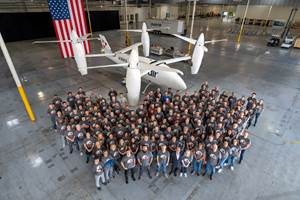U.S. Air Force awards airworthiness approval to Beta Technologies ALIA aircraft
Endorsement follows manned electric aircraft into next phase of flight testing, with the goal to enable new markets and accelerate UAM development.

Beta Technologies’ ALIA simulator in the company’s Washington, D.C. facility is a fully immersive eVTOL flight simulator and training facility. The simulator will enable Air Force pilots and engineers to experience the future of electric vertical flight by rehearsing and testing the ALIA aircraft in a variety of potential mission sets and scenarios. Photo Credit: U.S. Air Force
The U.S. Air Force (Wright-Patterson Air Force Base, Ohio, U.S.) has awarded airworthiness approval for a manned electric aircraft to (South Burlington, Vt., U.S.), a partner in the Agility Prime program, which is expanding technology, talent and transition partnerships for rapid and affordable commercial and military capability (this approval has also been secured by Joby Aviation). According to Beta Technologies, the endorsement will enable it to begin flying its composites-intensive ALIA aircraft in the Agility Prime program. The airworthiness award from the Air Force is the latest milestone in Beta’s test program after recently entering its next phase of flight testing.
“U.S. Air Force engineers spent more than a year examining Beta’s ALIA aircraft, evaluating its design and flight capabilities against the demanding MIL-HDBK-516C standard,” says Camron Guthrie from Beta. “U.S. Air Force personnel and subject matter experts evaluated the aircraft’s design and maintenance requirements along with the company’s operations and flight test plans.
According to Kyle Clark, Beta’s founder and CEO, electric aviation is a National Security priority and fortunately was recognized early by the Air Force. “The speed and efficiency of the Air Force Agility Prime program to support sustainable electric aviation has been remarkable,” he says. “The people and expertise that the Air Force has brought to the electric aviation industry and specifically our ALIA program is accelerating the development of capable, safe and reliable aircraft.”
“Agility Prime is about creating a new path to adopt advanced technologies in the Department of Defense [DoD] by working with innovative companies like Beta in ways that enable new markets.”
Under a new contract to be signed in June, the Air Force will have access to the manned, 7,000-pound class electric aircraft, and immersive electric vertical take-off and landing (eVTOL) simulators located in Washington, D.C., and Springfield, Ohio.
“This agreement will enable Air Force acquisition professionals to make data-driven decisions informed by real assessments of military utility,” says Col. Nathan Diller, AFWERX director.
Beta’s aircraft simulation and training facilities are said to enable Air Force pilots and engineers to experience the future of electric vertical flight by rehearsing and testing the ALIA aircraft in a variety of potential mission sets and scenarios. Further, the advanced urban air mobility (UAM) technology simulator, located near the Air Force Research Laboratory (AFRL, Springfield, Ohio, U.S.), reportedly provides easy access to the Air Force’s greatest technical experts and acquisition professionals and the Washington, D.C. facility provides an ideal venue for future operational concept developers across the Air Force, joint force and interagency to conduct research, assessing the opportunities of the electrified future. Beta Technologies says the state-of-the-art simulators are physics based and include weather, emergency handling and mission scenarios with multiple aircraft.
Agility Prime seeks to expand technology transition paths to accelerate emerging dual-use markets by leveraging government resources for rapid and affordable fielding. The Air Force believes that the structural testing being conducted on the ALIA aircraft will further advance the flight test program safely while providing valuable insight to the Air Force on a unique and novel aircraft design.
“Agility Prime is about creating a new path to adopt advanced technologies in the Department of Defense [DoD] by working with innovative companies like Beta in ways that enable new markets,” Diller sats. “The engineering, test and acquisition professionals in Air Force Materiel Command have phenomenal expertise to help accelerate this and other emerging markets.”
In March, Beta advanced to the next phase of its flight testing program, completing an interstate flight with ALIA from its Plattsburgh, New York, home airport test facility to the company’s headquarters near Burlington International Airport in Vermont. To abide by Federal Aviation Agency (FAA) protocols concerning the flight of experimental aircraft beyond designated test areas, Beta completed rigorous testing to ensure reliable and predictable aircraft performance. In the same week ALIA flew its first interstate flight, Beta says it also set a new record for range and altitude in ALIA of 130 nautical miles and 8,000 feet respectively.
More recently, the company also added to its growing customer list securing agreements with Blade Urban Air Mobility and UPS for its ALIA aircraft and charging stations. Beta partners now span medical, logistics, defense and passenger segments.
Related Content
Beta begins Alia CTOL production aircraft flight testing
Flight of first production aircraft fresh off Beta’s full-scale manufacturing line in Vermont is followed by Special Airworthiness certification from the FAA.
Read MoreJoby demonstrator makes 523-mile hydrogen-electric flight
Hydrogen-electric program builds on technology developed by H2FLY subsidiary, demonstrates potential for emissions-free regional travel using Joby’s all-composite eVTOL aircraft.
Read MoreJoby conducts FAA testing, moves into final certification
Successful static loading testing of tail structure and Type Inspection Authorization by FAA pilots moves Joby closer to its 2025 targets.
Read MoreOverair completes assembly of full-scale Butterfly eVTOL vehicle prototype
Overair heads to flight testing in early 2024, marked by rapid prototype development.
Read MoreRead Next
Ultrasonic welding for in-space manufacturing of CFRTP
Agile Ultrasonics and NASA trial robotic-compatible carbon fiber-reinforced thermoplastic ultrasonic welding technology for space structures.
Read MoreCeramic matrix composites: Faster, cheaper, higher temperature
New players proliferate, increasing CMC materials and manufacturing capacity, novel processes and automation to meet demand for higher part volumes and performance.
Read MoreScaling up, optimizing the flax fiber composite camper
Greenlander’s Sherpa RV cab, which is largely constructed from flax fiber/bio-epoxy sandwich panels, nears commercial production readiness and next-generation scale-up.
Read More












